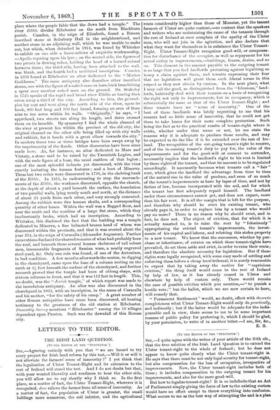LETTERS TO THE EDITOR,
THE IRISH LAND QUESTION.
[TO THE EDITOR OF TES "SPECTATOR,']
SIR,—Agreeing entirely with you that "we are bound to try every project for Irish land reform by this test,—Will it or will it not alleviate the farmers' sense of insecurity ?" I yet think that the legalization of Ulster Tenant-Right and its extension to the rest of Ireland will stand the test. And I do not doubt but that, with your wonted liberality and readiness to hear the other side, you will allow me to say shortly why I think so. In the first place, as a matter of fact, the Ulster Tenant-Right, wherever it is recognized, does relieve the farmer from all sense of insecurity. As a matter of fact, the population of Ulster is greater, the small holdings more numerous, the soil inferior, and the agricultural
rents considerably higher than those of Munster, yet the tenant farmers of Ulster are quite content,—so content that the speakers and writers who are maintaining the cause of the tenants through the rest of Ireland at once complain of the apathy of the Ulster men, who will not join in the agitation, and also declare that what they want for themselves is in substance the Ulster Tenant- Right. Ulster Tenant-Right recognizes good-will, or compensa- tion for disturbance of the occupier, as well as repayment for his actual outlay in itnprovements,—buildings, fences, drains, and so on. This element in the amount payable to the outgoing tenant is so large that you find landlords protesting agaiust legalizing so heavy a claim against them, and tenants expressing their fear that no legislation will grant them such liberal terms in this respect as they now obtain by custom. In the next place, what I may call the good, as distinguished from the "felonious," land- lords, habitually deal with their tenants on a basis of recognizing the right not only iii improvements, but in occupancy, which is substantially the same as that of the Ulster Tenant-Right ; and these tenants have no "sense of insecurity." One of the best of these landlords was lately regretting to me that his tenants had so little sense of insecurity, that he could not get them to take leases for their more complete protection. Such being the fact as to the practical results of tenant-right where it exists, whether under that name or not, let me state the reasons why it is adequate to produce those results, and may be expected to do the like if it be extended over the rest of Ire- land. The recognition of the out-going tenant's right to receive, and of the in-coming tenant's duty to pay for, the value of the improvements and for the good-will or consent to surrender, necessarily implies that the landlord's right to his rent is limited by these rights of the tenant, and that its amount is to be regulated accordingly. It necessarily becomes what tenants call a " fair " rent, which gives the landlord the advantage from time to time of the natural rise in the value of produce, and even of so much of the tenant's improvements as have by lapse of time, and not by fiction of law, become incorporated with the soil, and for which the tenant has first adequately repaid himself. The landlord under these circumstances cannot get, and does not expect, more than his fair rent. It is all the margin that is left for the purpose, and therefore why should he evict his existing tenant, who already pays it, in order to replace him by a tenant who would pay no more P There is no reason why he should evict, and in fact, he does not. The object of eviction, that for which it is actually resorted to, is to raise the rent by " feloniously " appropriating the evicted tenant's improvements, the invest- ments of his capital and labour, and reletting this stolen property to a new tenant. We know that the successors, whether by pur- chase or inheritance, of estates on which these tenant-rights have prevailed, do set them aside and evict, in order to raise their rents ; and therefore the absolute necessity for legislation. But if these rights were legally recognized, with some easy mode of settling and
enforcing them before a cheap local tribunal, it is surely reasonable to expect that by taking away the motive for "capricious eviction," the thing itself would cease in the rest of Ireland by help of law, as it has already ceased in Ulster and elsewhere by help of custom only. There would remain the case of possible eviction which you mention,—" to punish a hostile vote ;" but the ballot, which we are now certain to have, will remedy that.
" Permanent Settlement" would, no doubt, effect with theoretic completeness what Ulster Tenant-Right would only do practically, and indirectly ; but if the latter would be adequate for the indis- pensable end in view, there seems to me to be some important reasons of public policy for preferring it, which I should be glad, by your permission, to write of in another letter.—I am, Sir, &c., E. S.






























 Previous page
Previous page